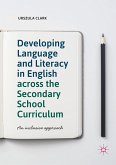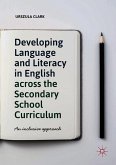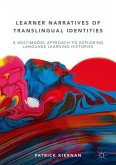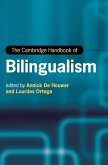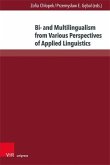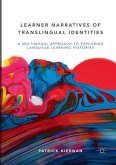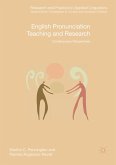The Psycholinguistics of Bilingualism presents acomprehensive introduction to the foundations of bilingualism,covering language processing, language acquisition, cognitionand the bilingual brain.
This thorough introduction to the psycholinguistics ofbilingualism is accessible to non-specialists with little previousexposure to the field
Introduces students to the methodological approaches currentlyemployed in the field, including observation, experimentation,verbal and computational modelling, and brain imaging
Examines spoken and written language processing, simultaneousand successive language acquisition, bilingual memory and cognitiveeffects, and neurolinguistic and neuro-computational models of thebilingual brain
Written in an accessible style by two of the field'sleading researchers, together with contributions frominternationally-renowned scholars
Featuring chapter-by-chapter research questions, this is anessential resource for those seeking insights into the bilingualmind and our current knowledge of the cognitive basis ofbilingualism
Hinweis: Dieser Artikel kann nur an eine deutsche Lieferadresse ausgeliefert werden.
This thorough introduction to the psycholinguistics ofbilingualism is accessible to non-specialists with little previousexposure to the field
Introduces students to the methodological approaches currentlyemployed in the field, including observation, experimentation,verbal and computational modelling, and brain imaging
Examines spoken and written language processing, simultaneousand successive language acquisition, bilingual memory and cognitiveeffects, and neurolinguistic and neuro-computational models of thebilingual brain
Written in an accessible style by two of the field'sleading researchers, together with contributions frominternationally-renowned scholars
Featuring chapter-by-chapter research questions, this is anessential resource for those seeking insights into the bilingualmind and our current knowledge of the cognitive basis ofbilingualism
Hinweis: Dieser Artikel kann nur an eine deutsche Lieferadresse ausgeliefert werden.
"The Psycholinguistics of Bilingualism is an absolute gem to read. It is concise and clear while not skimping at all on breadth and depth. Truthfully, this is a bit unsettling for those of us who have worked in this field. Capturing such a wide array of topics in a single volume is a gargantuan task. Grosjean and Li should be applauded for helping to shape such an excellent text. Most importantly, the editors and authors help to convince the reader of the importance of dynamic processing, whether it be in computer models that have to adapt to language input, brain images that capture how bilinguals switch between languages, or in the nature of speech that takes into account how bilinguals adapt to different linguistic situations. By bringing all of these pieces together, Grosjean and Li have provided a true gift for those who would like to learn more about this field." (Language, 1 December 2013)
"Those with an interest in bilingualism would find the chapter on writing helpful due to the small number of bilingual studies, especially looking at two languages in one bilingual, rather than comparing bilingual writings to monolingual writings. Those interested in bilingual code-switching would also find it a useful reference as code-switchng is discussed from different perspectives in several chapters. Undergraduate students studying psycholinguistics are provided with a complete overview on controversial issues such as the critical period hypothesis for language acquisition or the bilingual mental lexicon with the relevant influential articles and hypotheses, listed chronologically. Thus, this book is an ideal choice for an undergraduate or postgraduate course book in introducing various fields of applied linguistics, bilingualism, and also the psycholinguistics of bilingualism." (International Journal of Bilingual Education and Bilingualism, 28 August 2013)
"The book is written in a friendly tone that's easy to understand and engage with, making it perfect for anyone who's looking to learn more about psycholinguistics or bilingualism - and with great chapters by some of the biggest names in the field, there's no doubt that the information packed into this little volume is of the highest quality." (First Language, 1 January 2014)
"I enjoyed reading this book and would very much recommend it to students, teachers and anyone else interested in the field. If you have not been fascinated by bilingualism before, you will be after reading the introduction chapter!" (The Nordic Journal of Linguistics, 1 May 2014)
"It is refreshing to see a textbook that offers a comprehensive introduction to bilingual language processing, language acquisition, cognition and memory, and the bilingual brain. Each chapter presents current debates and issues in their respective subfields accompanied with clear and concise illustrations of empirical studies. Written by prominent researchers, all the chapters are not only remarkably up to date in the various areas covered but also quite accessible to the non-specialist ... Whether the reader is mainly looking for a comprehensive overview of the up to date literature or instead looking for suggestions for new avenues of research, this book provides an abundance of information." (International Journal of Applied Linguistics, 1 October 2013)
"This book exceeded my expectations, and I find it difficult to point out shortcomings, as it is perfectly aligned with its declared aims." (The LINGUIST List, 1 May 2013)
"Those with an interest in bilingualism would find the chapter on writing helpful due to the small number of bilingual studies, especially looking at two languages in one bilingual, rather than comparing bilingual writings to monolingual writings. Those interested in bilingual code-switching would also find it a useful reference as code-switchng is discussed from different perspectives in several chapters. Undergraduate students studying psycholinguistics are provided with a complete overview on controversial issues such as the critical period hypothesis for language acquisition or the bilingual mental lexicon with the relevant influential articles and hypotheses, listed chronologically. Thus, this book is an ideal choice for an undergraduate or postgraduate course book in introducing various fields of applied linguistics, bilingualism, and also the psycholinguistics of bilingualism." (International Journal of Bilingual Education and Bilingualism, 28 August 2013)
"The book is written in a friendly tone that's easy to understand and engage with, making it perfect for anyone who's looking to learn more about psycholinguistics or bilingualism - and with great chapters by some of the biggest names in the field, there's no doubt that the information packed into this little volume is of the highest quality." (First Language, 1 January 2014)
"I enjoyed reading this book and would very much recommend it to students, teachers and anyone else interested in the field. If you have not been fascinated by bilingualism before, you will be after reading the introduction chapter!" (The Nordic Journal of Linguistics, 1 May 2014)
"It is refreshing to see a textbook that offers a comprehensive introduction to bilingual language processing, language acquisition, cognition and memory, and the bilingual brain. Each chapter presents current debates and issues in their respective subfields accompanied with clear and concise illustrations of empirical studies. Written by prominent researchers, all the chapters are not only remarkably up to date in the various areas covered but also quite accessible to the non-specialist ... Whether the reader is mainly looking for a comprehensive overview of the up to date literature or instead looking for suggestions for new avenues of research, this book provides an abundance of information." (International Journal of Applied Linguistics, 1 October 2013)
"This book exceeded my expectations, and I find it difficult to point out shortcomings, as it is perfectly aligned with its declared aims." (The LINGUIST List, 1 May 2013)


